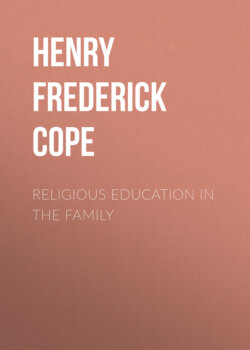Читать книгу Religious Education in the Family - Henry Frederick Cope - Страница 21
На сайте Литреса книга снята с продажи.
§ 1. THE DOMINANT MOTIVE
ОглавлениеThe chief end of society is to improve the race, to develop the higher and steadily improving type of human beings. We can test the life of the family and determine the values of its elements by asking whether and in what degree they minister to this end, the growth of better persons. This is more than a theoretical aim or one conceived in a search for ideals. It is written plain in our passions and strongest inclinations. That which parents supremely desire for their children is that they may become strong in body, capable and alert in mind, and animated by worthy principles and ideals. The parent desires a good man, fit to take his place, do his work, make his contribution to the social well-being, able to live to the fulness of his powers, to take life in all its reaches of meaning and heights of vision and beauty. In true parenthood all hopes of success, of riches, fame, and ease, are seen but as avenues to this end, as means of making the finer character, of growing the ideal person. If we were compelled to choose for our children we should elect poverty, pain, disgrace, toil, and suffering if we knew this was the only highway to full manhood and womanhood, to completeness of character. Indeed, we do constantly so choose, knowing that they must endure hardness, bear the yoke in their youth, and learn that
Love and joy are torches lit
At altar fires of sacrifice.
With this dominating purpose clearly in mind we are prepared to ask, What are the elements of family life which among the changes of today we need most carefully to preserve in order to maintain efficiency in character development? In days when the outer shell of domestic arrangements changes, when readjustments are being made in the organization of the family, what is there too precious to lose, so worthy and essential that we waste no time when seeking to maintain it?
